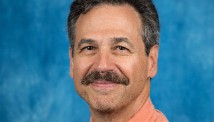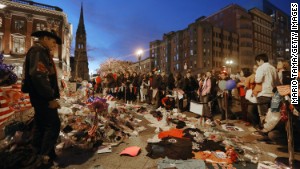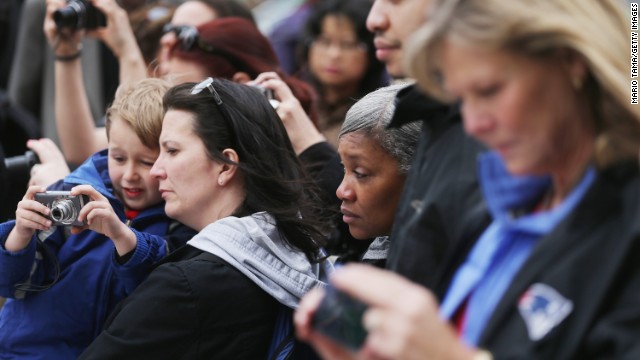Smartphones help catch a terror suspect
April 24, 2013 -- Updated 1327 GMT (2127 HKT)
People take photos at a makeshift memorial for victims of the Boston Marathon bombings.
STORY HIGHLIGHTS
- Gary Kessler: Boston bombing used public's photos, videos at unprecedented rate
- Criminal cases will rely more on public as thousands take pictures and videos, he says
- Unmindful of privacy, he says, a community worked together for a greater good
- Kessler: Crowdsourcing in criminal investigation will happen more and more
Editor's note: Gary C. Kessler is an associate professor of homeland security at Embry-Riddle Aeronautical University in Daytona Beach, Florida, teaching cybersecurity and digital forensics, and president of Gary Kessler Associates, a mobile device forensics and cybersecurity practice, training and consulting company. Kessler is a member of the North Florida and Vermont Internet Crimes Against Children Task Forces.
(CNN) -- The Boston Marathon bombing investigation made use of crowdsourcing to collect photos and video from cell phones and surveillance cameras at an unprecedented level. These pictures were made public a little more than 72 hours after the explosions and the second suspect was arrested 29 hours later.
Forensics is the use of scientific or technical information to answer questions in a court of law. Digital forensics is the branch that focuses on the identification, acquisition and analysis of information found on digital devices: computers, cell phones, digital cameras or any computer-based system.
The concept of law enforcement posting photos of wanted individuals in a public place and asking for assistance is hardly new; walk into any post office and you will still see the FBI Most Wanted poster. Why the post office? Because it used to be the social center of a town, a place where the government and the people regularly came together.

Gary Kessler
Fast forward to 2013 and we have thousands of people taking pictures and videos of what everyone expected to be an every day event. Law enforcement agencies were able to use these images to observe the comings and goings of hundreds of people at a certain site at a certain time in order to detect a pattern of behavior with which to identify the two suspects. And most of this imagery came from private citizens.
Personal computers have been around for nearly 30 years. The Internet has been commercially available for 20 years. Mobile phones have been pervasive for more than 10 years and smartphones, in particular, for more than five. Computers, networks and cell phones have increasingly become the record keeper, instrument or target of criminal activity over the last few decades.
Smartphones are everywhere and offer the equivalent of a portable Internet terminal. Not only do cell phones contain a phone book, call history and text messages, but also Web browser history, email, Global Positioning System and other location information. And surprisingly high-quality pictures and video.
Become a fan of CNNOpinion
Stay up to date on the latest opinion, analysis and conversations through social media. Join us atFacebook/CNNOpinion and follow us @CNNOpinion on Twitter. We welcome your ideas and comments.
All of this information will be of value to investigators. They will want to know who the suspects might have been communicating with in the immediate aftermath of the bombings and, again, in the aftermath of their pictures being posted in the media. The larger investigation will undoubtedly examine their text and email messages, social media postings, Web sites visited and calls made over the last few months and years. This digital forensic evidence will help piece together patterns of behavior that could provide insights into the suspects' thoughts and deeds, and even provide new leads.
What does this mean for privacy rights? Consider that when a municipality wants to put up a new camera at an intersection, or purchase a drone, there is often a public outcry. Is the camera an invasion of privacy? Where will it be looking? How will the government use the data? How long will the data be kept? Will it be used to track my movements? At some level, these are good and important questions because this kind of discourse is necessary to frame our Fourth Amendment protections against unreasonable searches.
Yet, in Boston, a lot of the images came not from public-sector cameras but from private-sector cameras: our fellow citizens. Fellow citizens who voluntarily shared their information so that law enforcement could do its job.
Were these people violating the rights of others by sharing their pictures? Well, no, considering that the Bill of Rights was intended to protect us against a tyrannical government rather than from each other. Indeed, it is not clear that the government could have compelled these citizens to turn over their pictures just in case they might be useful; imagine persuading a judge to sign a search warrant on such pure speculation.


Yet, citizens stepped forward to offer their help, a clear sign of a community willing to work together for a greater good and one that does not distrust the government.
Although some might claim that these people were surrendering their rights for an element of security, it was the same instinct that made some people run toward the carnage so that they could provide assistance and comfort to friends, family and strangers. They were not surrendering their rights when they helped law enforcement but were empowering themselves as a community.
The U.S. Constitution does not explicitly offer citizens a right of privacy, although many court decisions certainly support such an ideal. Indeed, U.S. Supreme Court Justice Louis D. Brandeis is well known for his observation, "The right to be left alone -- the most comprehensive of rights, and the right most valued by a free people."
Your personal privacy has more to fear from the likes of Facebook and Google than from the government. Commercial entities such as social media sites offer free services and yet make money. How?
We, our information, have become their commodity. They have more money, motivation and resources to use our collected information for their own purposes than the government does. We, as users of social media, self-exploit; we post our information voluntarily. Yet, once posted, we usually lose exclusive ownership of the information and always lose control over it.
Although the use of the crowdsourcing metaphor may be new as it applies to a criminal investigation, it is almost certain we will see more of this in the future. And it is sure to renew questions about how we all are invading each other's privacy and personal space.
It also points to the incredible resiliency of the U.S. Constitution and its ability to guide us in a modern era, yet why it needs constant interpretation. As technologies evolve that the Founders could not have possibly anticipated -- from fully automatic weapons and thermal imagers to satellites and digital technologies -- we have to figure out how to balance our rights as individuals and needs as a society.
Follow @CNNOpinion on Twitter.
Join us at Facebook/CNNOpinion.
The opinions expressed in this commentary are solely those of Gary Kessler.
We recommend
From around the web
April 25, 2013 -- Updated 1948 GMT (0348 HKT)
Mark Ruffalo and Phil Radford say fossil fuel companies are pushing natural gas, extracted by fracking -- a "bridge fuel' to nowhere
April 25, 2013 -- Updated 1442 GMT (2242 HKT)
Donna Brazile's family lost everything to Katrina. She says despite her many differences with President Bush, he pulled through after a bad start in helping the Gulf Coast.
April 25, 2013 -- Updated 1312 GMT (2112 HKT)
Arthur Caplan and Zachary Caplan explain how Big Pharma's shenanigans keep lower-cost generic prescription drugs out of the hands of consumers
April 25, 2013 -- Updated 0947 GMT (1747 HKT)
CNN iReport is asking runners and would-be runners to sign up to run a race -- maybe a marathon? -- as a show of solidarity with, and support for, the victims of the Boston bombing.
April 25, 2013 -- Updated 1415 GMT (2215 HKT)
Teresa Ghilarducci says a proposal to raise the cost of visiting national parks for senior citizens seems like another attempt to erode older Americans' financial situation.
April 24, 2013 -- Updated 1919 GMT (0319 HKT)
LZ Granderson says gun murders in Chicago are rampant, and children must navigate gang territory on the way to school. If this isn't terror, what is?
April 24, 2013 -- Updated 1510 GMT (2310 HKT)
Dean Obeidallah is Muslim and despises terrorism -- just like every single Muslim he knows. And he knows a lot of them.
April 24, 2013 -- Updated 2211 GMT (0611 HKT)
Ken Ballen says young men who turn to Islamic radicalism often have a deep and hidden personal crisis.
April 24, 2013 -- Updated 1225 GMT (2025 HKT)
Frida Ghitis says the moment the Boston Marathon came under attack, the country pulled together and rallied. But what about the slaughter we are inflicting on ourselves?
April 24, 2013 -- Updated 1327 GMT (2127 HKT)
Gary Kessler says most of the images used in the Boston manhunt were voluntarily supplied by the public. This crowdsourcing in criminal cases is the future.
April 24, 2013 -- Updated 1146 GMT (1946 HKT)
Benjamin Jealous says mass incarceration, which affects blacks disproportionately, is a fundamental civil rights issue with a high cost to taxpayers. The GOP should take it on
April 23, 2013 -- Updated 1535 GMT (2335 HKT)
Peter Bergen says questions are arising about the relationship between Iran and al Qaeda in the wake of the thwarted terror plot in Canada.
April 23, 2013 -- Updated 1410 GMT (2210 HKT)
John Sutter says the Scouts' plan to welcome gay Scouts but not gay adult scout leaders doesn't make sense.
April 23, 2013 -- Updated 1823 GMT (0223 HKT)
Folk singer Richie Havens, who died Monday at 72, catapulted to fame as the opening act at Woodstock. On the festival's 40th anniversary, in 1969, he wrote this reflection for CNN.com.
April 23, 2013 -- Updated 1229 GMT (2029 HKT)
David Frum says that traumatic events such as the Boston bombings don't lead to policy changes.
April 23, 2013 -- Updated 1155 GMT (1955 HKT)
Neil Richards says more cameras won't protect us; they could actually take away our civil liberties and make us vulnerable to a "police state."
April 24, 2013 -- Updated 1658 GMT (0058 HKT)
David Rothkopf says our reaction to a week of mayhem shows we react to violent acts that fit our idea of terror, but less so to ones more likely to actually affect us, such as Senate inaction on guns.
April 24, 2013 -- Updated 0945 GMT (1745 HKT)
Robert Liscouski says improvised explosive devices are one of the biggest threats to the U.S.
April 25, 2013 -- Updated 1509 GMT (2309 HKT)
The opening of George W. Bush's presidential library is rekindling debate over the legacy of the 43rd president, writes Julian Zelizer.
April 22, 2013 -- Updated 1507 GMT (2307 HKT)
David Frakt says the federal death penalty shouldn't be a reason to keep the trial of the bombing suspect out of state court.
April 22, 2013 -- Updated 1544 GMT (2344 HKT)
As we look for "lessons" from Boston, we shouldn't forget the haunting words of 8-year-old Martin Richard, says Donna Brazile.
April 21, 2013 -- Updated 1736 GMT (0136 HKT)
Peter Bergen says the experience of terrorists in the West might shed light on the Tsarnaev brothers.
April 22, 2013 -- Updated 1422 GMT (2222 HKT)
Alex Castellanos says the state's Lt. Gov. Gavin Newsom has the right idea: reinvent government with today's technology.
April 24, 2013 -- Updated 1725 GMT (0125 HKT)
Is anybody out there? A discovery by NASA's Kepler satellite sheds new light on that question, says Meg Urry.
April 20, 2013 -- Updated 1258 GMT (2058 HKT)
Eric Lohr decribes the situation in Chechnya, which informs the lives of the suspected Boston bombers' families.
Most Popular
Today's five most popular stories

































No comments:
Post a Comment